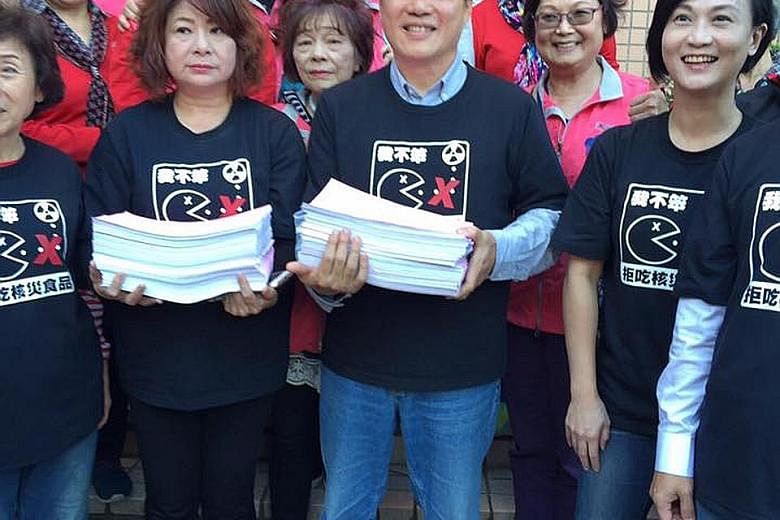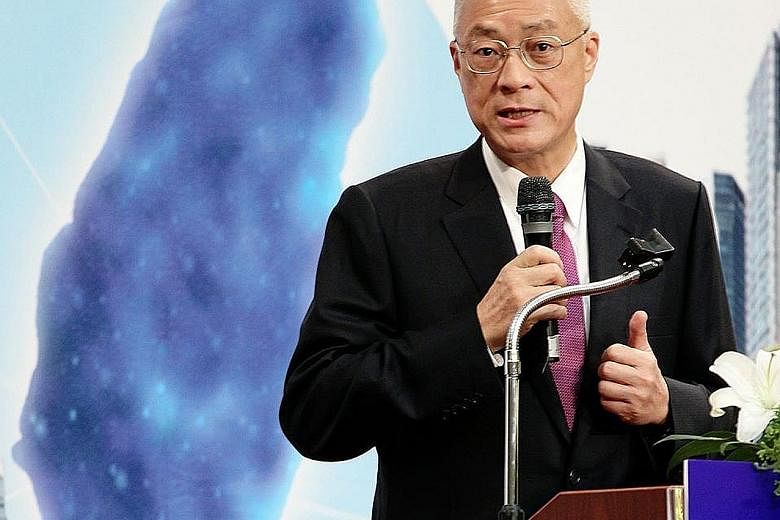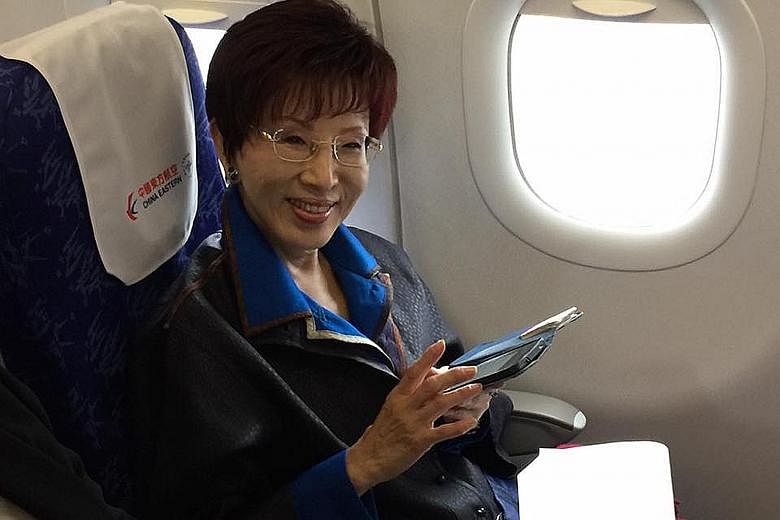WU DEN-YIH, 69
Smooth operator with strong grassroots support
When it comes to experience, his "grey eminence" Wu Den-yih wins hands down.
During a political career of more than 40 years, the former county chief of his native central Nantou has risen through the ranks to become the island's premier and most recently, its vice-president.
No surprise then that in a recent poll of nearly 700 voting KMT members, 53 per cent said they expect Mr Wu to win, followed by the incumbent, Ms Hung Hsiu-chu (16 per cent), and former Taipei mayor, Mr Hau Lau-bin (8 per cent).
The other three candidates are former party vice-chairman Steve Chan, former lawmaker Pan Wei- kang and former Taipei Agricultural Products Marketing Co general manager Han Kuo-yo.
Mr Wu, a history graduate from the prestigious National Taiwan University and a former journalist with the China Times newspaper, is not only book smart, but also widely seen as a smooth operator with street smarts.
Compared with his ex-boss, the Harvard-educated former Taiwan president Ma Ying-jeou, Mr Wu also has more of the common touch - he announced his bid for the party's top post with a campaign song that he penned, called "No Turning Back".
"I hope that the song will make it easier to remember what I stand for," said Mr Wu, who has won Mr Ma's endorsement to be KMT chief.
But it remains to be seen if Mr Wu, a father of four who has pledged to inject young blood into the venerable party, can get KMT voters to march to his tune and choose him as party chief.
National Taiwan University political scientist Wang Yeh-lih said that while Mr Wu is seen as a steady pair of hands, he also comes across as an establishment candidate at a time when voters are anxious for change.
But Mr Wu, a former mayor of southern Kaohsiung city, has an advantage in his strong grassroots networks in central and southern Taiwan. This may make the difference in a close contest for KMT chief and the upcoming 2018 mayoral elections, said Professor Wang.
"If he does win the chairmanship, the KMT may stand a better chance at the upcoming local elections."
HUNG HSIU-CHU, 69
Fiery KMT loyalist who supports unification with China
If grit and loyalty are the key qualities needed to be KMT chief, the woman nicknamed "Little Hot Pepper" will be a shoo-in for the job.
Ms Hung Hsiu-chu, a former teacher who has remained single, has continued to devote her life to the KMT despite being booted out as the party's candidate for the 2016 presidential election in a last-minute swop.
Despite the humiliation, she declared then: "It's okay for the party not to want me, but I will never abandon the party."
Indeed, Ms Hung, a 1.6m-tall dynamo known for her fiery style and outspokenness, has often gone to the party's rescue at times of crisis.
She stepped up to helm the embattled party after former KMT chairman Eric Chu, who replaced her in last year's presidential election, stepped down after the party's loss.
Ms Hung's personal story has also endeared her to many Taiwanese - she overcame poverty to put herself through law studies at what is now the Chinese Culture University in Taipei. After graduation, she went into teaching as lawyer jobs were hard to come by, and soon made her mark as a disciplinary mistress at a secondary school.
But it was her oratory skills that got her noticed by a senior KMT official, who roped her in to help run women's activities for the party.
She later became a legislator and worked her way up to be deputy legislative speaker.
Ms Hung, whose father had moved the family from mainland China to Taipei in 1946, when civil war broke out, enjoys support from the "deep blue", pro-unification faction in the KMT, made up of mainly "waishengren" (mainlanders).
When Ms Hung met Chinese President Xi Jinping last year, she vowed to oppose Taiwan independence and uphold the "one China" policy to maintain cross-strait peace and stability.
But her openly pro-unification stance worries some party leaders at a time when Taiwanese are wary of closer ties with China, and when most want to retain the status quo of de facto independence.
Another weakness is that, unlike her rival Mr Wu, Ms Hung does not have any policymaking experience.
"Many people do not see her as an effective leader and, even as party leader, she has not made any impactful change. The KMT is still very much in crisis mode," said National Sun Yat-sen University political scientist Liao Da-chi.
HAU LUNG-BIN, 64
Son of former premier and general will need backing of military men
Mr Hau Lung-bin is a political blue blood. His father is former premier Hau Pei-tsun, perhaps better known for once serving as army commander-in-chief.
The younger Mr Hau majored in agricultural chemistry at the National Taiwan University and obtained a doctorate in food science and technology from the University of Massachusetts Amherst.
He returned to Taiwan and taught as a professor before becoming a lawmaker in 1995, and later serving as chief of the central government's Environmental Protection Administration.
Mr Hau, a father of two, became Taipei mayor in 2006 after defeating the Democratic Progressive Party's Frank Hsieh. In 2010, he edged out Mr Su Tseng-chang of the DPP to win re-election.
Mr Hau had previously had been touted as a possible future presidential candidate but his star dimmed after he failed to win the seat of northern Keelung city in the 2016 legislative election.
He said he was throwing his hat into the ring to be KMT chief as the party was going "downhill" and the public was unhappy with the current situation in Taiwan.
"Rather than sit and wait, it's better to rise and act," said Mr Hau, who had announced his bid for the party's top job on Facebook in a bid to reach out to the young.
Since then, he has often put up Facebook posts on how to revitalise the party, for example, by fielding "refreshing candidates" to improve the KMT's image.
Mr Hau is trailing his rivals Wu Den-yih and Hung Hsiu-chu in opinion polls, Prof Wang noted, adding that the candidate knows he will need the support of KMT's "deep blue" faction, who still make up the majority of voters.
"He will most probably have to also use his links to his father, who was a former military commander, to get the support of the military establishment, who have traditionally been KMT loyalists."




